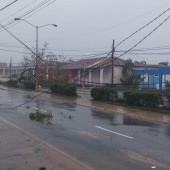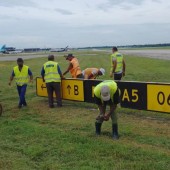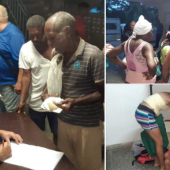Fidel Castro’s military deployments were supported by the USSR which viewed potential Cuban victories as a benefit to Soviet geopolitical interests because deployments were launched in third-world countries to replace existing governments with Marxist regimes.
During the 1970s and 1980s, Cuba boasted having one of the best prepared and modern armies. Data from the Global Firepower site currently ranks the regime at 10 of 18 in military powers in Latin America. Worldwide, it stands at 76.
Throughout 16 years, the Cuban regime sent nearly 400,000 Cubans -- between already trained troops and enlisted civilians -- to fight Castro’s wars in Africa. There, 2,289 Cubans lost their lives. The psychological and physical consequences of those who survived now feel abandoned by the regime they once risked their lives for.
The Forgotten Veterans of Castro’s Wars
Fernando Hernández Leblanche described himself as a forgotten veteran of the Cuban regime. He spoke exclusively with ADN Cuba journalists about his hardships and his experiences in Angola, the country to which he was sent to fight alongside thousands of Cuban soldiers.
In 1983, the regime recruited him as a soldier of the Revolutionary Armed Forces (FAR), and at that time the then young Cuban was only 20 years old.
Upon arriving in Angola, Hernández Leblanche says the recruits had to cross a bridge. As they crossed it, they saw nine dead Cubans already lying on the road.
“Afterwards, we spent about nine days without eating without having breakfast and without drinking water, walking day and night to take the town of Musende, which was in the South. When we took it, they congratulated me on behalf of Fidel Castro Ruz.
There I spent two years experiencing need, hunger, and misery until I fulfilled my mission,” he said in the video interview.
The native Santiago de Cuba resident narrates that an Angolan with whom he became close friends gave him a t-shirt and the news reached the headquarters.
“I was sanctioned for two more months on a mission for that fact. I went to Angola, easily to be killed and without being able to bring anything.
“When I arrived in Havana, they gave me a diploma for being a first-class internationalist, for all the fighting I was in. That diploma is what they give you as an award in Cuba, they don't give you anything other than a paper. Later, the regime registered me in the ‘Combatants Association’. The only thing the revolution gave me for going to Angola is this piece of paper," said the veteran, showing the card of the organization that commonly bonds Cuban combatants.
Castroist rhetoric promoted interventionist missions around the world which were called 'internationalist missions' or 'proletarian internationalism,' but critics of the regime called this stage 'Cuban military imperialism.'
In 2011, a group of Angolan war veterans (Operation Carlota) prepared a class-action lawsuit against the Cuban government. All of them resided in Santiago de Cuba and the precarious conditions in which they lived prompted them to sue the regime.
Hernández Leblanche currently lives with his family in a garage, a gift from a cousin. The place has been adapted to serve as a home, but the conditions are terrible.
“This is not a house, it is a garage that my cousin gave me. I had my family here. My son is physically handicapped from birth. I have been asking the Cuban government for help for a while to fix this and I have been denied because I speak the truth."
Like other Cuban war veterans, Hernández Leblanche does not receive any financial aid from the State, but he would be willing to if they offered it.
“The revolution has completely abandoned me. In Cuba there is a great need, food has risen in price, water is bad, we don't have money. I'm hungry, if I eat lunch, I don't have dinner.
“All the combatants are abandoned by the government,” he concluded.
In an interview published in Cubadebate in 2017, the then president of the Association of Combatants of the Cuban Revolution (ACRC) in Plaza de la Revolución, Orestes Román who is a veteran of the Angolan war said, “The association works together with the Ministry of Labor and Social Security to see what problems the combatants have, accompany them and improve their quality of life.”
However, he added they were not able to increase the [veterans'] salary, but “when a person who earns 240 pesos receives all the necessary medicines, eats in a family dining room, is given a bedding module, a subsidy to repair the house, then the salary amount has [sufficiently] been increased.”
Contrarily, since January, ADN Cuba has interviewed over 60 Cuban veterans who live in neglect in remote areas, the majority of them being Afro-Cubans who receive no subsidy and whose pensions hardly allowed them to access basic needs.
On January 25th, Gastón Sariol, a retired Captain of Cubana de Aviación sent a letter to Cuban Vice President Marino Murillo in which he outlined the cost of living for a Cuban veteran.
"Then [Diaz-Canel] blindly talks about the increases in retirement as good, so I ask him: Do you know how much it costs to put some water tanks for a house? Surely not, because yours were [installed] by a state brigade," said Sariol, a former helicopter pilot.
"Do you know how much a meter of pipe or a stopcock costs? [You may] spend your salary… possibly even more," the pilot added.
The "Ordinance Task" launched by the Cuban regime to carry out the elimination of the Cuban convertible peso (CUC) has also adversely affected the retirees of the military forces of Castroism.
One Cuban, only identifying themselves as Emilio HD expressed similar malcontent in the comments of regime publication, Mesa Redonda, saying: “I would like there to be some explanation given to the people or guidance to the entities that have to do with the reestablishment of the checkbooks or magnetic cards of the retirees of the FAR [Revolutionary Armed Forces] specifically for this year 2021."
In another case, 80-year old and five-medal war-veteran Eulises Cabrera Cabrera said he feels forgotten by the same regime he defended “after squeezing his best years from him.”
Today, he feels abandoned, now living in a Santiago de Cuba house where the walls are made of cloth in the neighborhood of El Cristo.
For José, the war in Angola and prison in Cuba were the same
In 1979, while José Diaz Santa Cruz was serving in the Vaca Muerta unit (in English, ‘Dead Cow’) on the outskirts of Havana, he was put on a boat with hundreds of young men without prior notice and shipped off to the Angolan war.
“It was an order, it was not discussed. Not even our families could know where we were. I was assigned to an infantry battalion in Lobito, and then to an exploration company in Cangamba. I have never discussed this issue with anyone, it gives me hives to remember it,” he said one afternoon at his home on Third Street, in Jaimanitas.
Today, José survives thanks to his talent for the fine arts. As a child, he dreamed of being a famous painter and hanging his paintings in great museums around the world, but in the end, he ended up only making signs for coffee shops or painting houses with a broad brush.
“In order to survive, I have postponed my two great projects: The birth of the world and God sweeping the street. I don't have the resources to buy brushes or oil paints, much less wood for the racks. I have never painted war, not even in a surrealist style. And less from prison ... "
Upon returning from Angola, the regime he served in distant lands made him "face another war, more cruel, inhuman: the unjust prison for an alleged illegal exit plan."
José spent four years in the “Combinado del Este” prison, on suspicion of an illegal departure.
"They accused me of something absurd; building a raft. There was no evidence whatsoever, not a single witness, only the tip-off of the president of the CDR [Committee for the Defense of the Revolution] who had harassed me on the street, ” he explained.
“There, my dreams of being someone in life ended... [it was] an injustice the size of planet Earth. At the trial, they did not even let me defend myself, they did not take into account [my service in an] internationalist mission at all, nor my feat of saving an entire squad from death, nor having returned with a gunshot wound to the leg.”
He recalls that in Angola he knew “inhospitable, unreal places, and saw the horror in its crudest form.”
For some veterans, their experience has left them bitter, not only about their loss of faith in the country they served but life itself.
Eulises Cabrera Cabrera, an 80-year old veteran told ADN Cuba, “I almost gave my life when I was young, [dedicating my life to them] until I was 60, and [now] look what I have. It's all lies they are throwing at us here. They don't help me at all. I am sick of life.”





























